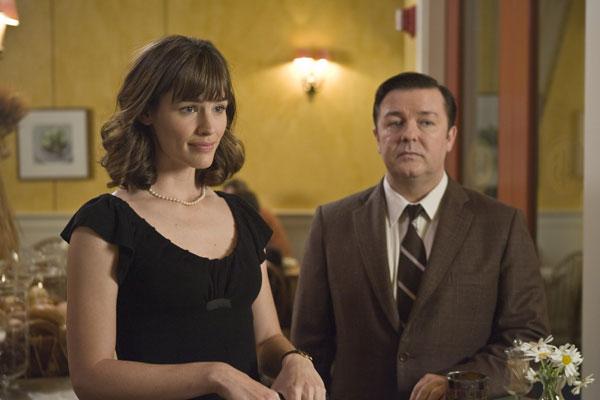By Phillip Levin / Asst. Inscape Editor

( Warner Bros. Pictures)
By Phillip Levin / Asst. Inscape Editor
“The Invention of Lying” is one of those movies that sounds great on paper, but in reality doesn’t work so well.
Mark Bellison, played by comedian/writer Ricky Gervais, is an unsuccessful lecture film writer. He lives in an alternate reality in which nobody has discovered the ability to lie–yet. More accurately, in this world, everybody tells the truth–or at least whatever is on their mind–all the time. That is until Bellison stumbles upon something new: lying.
“The Invention of Lying” is really two films. The first movie features Bellison going to work and living in this strange world in which no one can lie.
This part of the movie isn’t so bad. Conceptually, it’s a little funny. During the first few scenes it’s difficult not to laugh at the frankness of this uncanny world and its tell-it-like-it-is population. Honest advertising, in particular, is great.
But rather quickly, the novelty wears off and you’re left with the realization that Bellison’s world is thoroughly depressing to watch.
His world is entirely pessimistic, self-centered and unhappy.
Right around the time that this truth sets in, Bellison tells the world’s first lie. For a brief moment, it appears there’s not only hope for Bellison in this hopeless world but that there’s hope for this hopeless film. It’s just a flash of hope, though, and it quickly disappears.
One would think that Bellison could have a lot of fun living in a world in which he can lie and get away with it. Not surprisingly, the first thing he tries to do is get laid, but Bellison can’t even pull that off. He abandons that plan and refocuses most of his energy on a woman he recently went on a date with, Anna McDoogles (Jennifer Garner). But even with his exclusive ability to lie, he doesn’t make much progress with her.
Queue the second part of the film. Bellison, trying to comfort his dying mother, tells her a “lie.” He tells her that when she dies, she’ll go to her favorite place, and she’ll live with the Man in the Sky. Suddenly, the tone of the film has changed. From here on out, the movie focuses primarily on Bellison’s description of the afterlife, which gets the attention of the whole world.
If one’s listening to the message of “The Invention of Lying,” it seems to be that life is pointless, depressing and void of happiness. It’s hard to laugh at that.
Whether you’re religious or not, it’s obvious that there’s a bit of a satirical argument against God here. But that’s not even why the movie falls flat. It’s a dud because it fails to execute well on its premise. Conceptually, there’s potential for a movie about the world’s first lie. But rather than lightheartedly poke fun at lying, it uses a serious, touchy issue as its stage. The result isn’t laughter or happiness, which is what I think comedies should bring. Yes, it gets you thinking, but what about? How hopeless life is?
“The Invention of Lying” is certainly a thought-provoking movie. Perhaps it would have been better received if it were advertised for what it really is.






